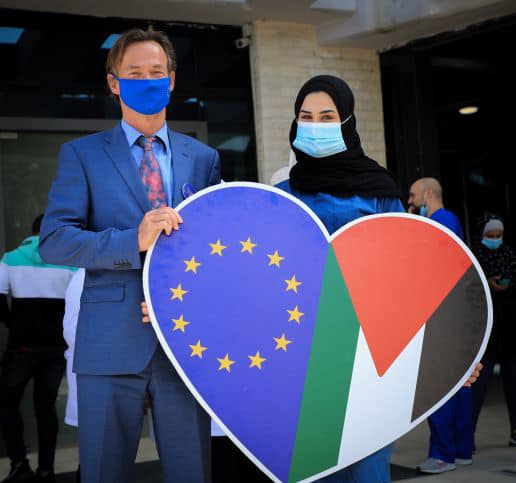
Brussels /PNN/
The European Commission (EC) yesterday approved a new bilateral allocation to Palestine worth €224.8 million.
This new assistance package will support the Palestinian Authority and crucial projects in the occupied Palestinian territory, according to an EC statement. This package complements previous contributions, such as €92 million to support the United Nations Relief and Works Agency for Palestine Refugees (UNRWA), bringing the total EU assistance to the Palestinians in 2021 to €317 million.
This does not include a further €25 million in humanitarian funding announced in May, said the statement.
This package includes €145.35 million to support the Palestinian Authority in the payments of the salaries and pensions of civil servants, the social allowances to vulnerable families, the referrals to the East Jerusalem Hospitals, and the purchase of COVID-19 vaccines authorized by the European Medicines Agency (EMA).
In the framework of the EU’s Food and Resilience Facility in support of its Southern Neighborhood partners, €10 million will be added to the allowances component, which will therefore amount to €50 million in total. This additional support will aim to address the consequences of rising prices of food and commodities in Palestine, thus helping mitigate the impact of Russia’s war against Ukraine, it said.
As part of the €145.35 million packages, €13 million is allocated for referrals to the East Jerusalem hospitals. A specific program of €36 million for the period 2021-2023 will also aim to enhance the living conditions in East Jerusalem in order to respond to the continued deterioration of socio-political and economic trends.
With a view to fostering sustainable economic development in occupied Palestinian territory and reducing aid dependency, €30.5 million are allocated to private sector development. This support will target key Palestinian economic sectors that have the potential to stimulate inclusive economic growth and will enhance digitalization, diversification of trade, and innovation, thus boosting the economy, according to the EC statement.
It will also contribute to the economic recovery efforts in Gaza, notably supporting micro, small and medium-sized enterprises, as well as reconstructing and developing damaged economic infrastructure.
Moreover, in this package, the EU has earmarked €10 million for two major infrastructure projects in Gaza that are part of the EU’s flagship projects under the EU’s Economic and Investment plan for the Southern Neighborhood: the gas for Gaza pipeline and the Gaza central desalination plant-related works.
Finally, and in line with EU commitment towards gender-related issues, €3 million will promote gender-responsive policies and laws in the occupied Palestinian territory.
Following his meeting with Palestinian Prime Minister Mohammad Shtayyeh, the EU Representative, Sven Kühn von Burgsdorff said: "The European Union renews its financial commitment to the Palestinian people. This EU support will help the Palestinian Authority maintain crucial public services in the health and education sectors and protect the poorest families through its social protection scheme, in addition to incentivizing further reform in key economic sectors. We also support Palestinians in Gaza and East Jerusalem through a variety of strategic interventions and projects. While these are tangible steps on the ground to improve the lives of the Palestinian people, they will neither be sustainable nor sufficient in the absence of fundamental political changes: a democratically elected national political leadership is indispensable for establishing a representative and accountable government for the entire occupied Palestinian territory. This will not only facilitate the resumption of the peace process, it will ultimately pave the way for a contiguous, viable, sovereign, and democratic Palestinian State and for peace and security for all."
The EU remains a steady supporter and one of the main donors of Palestinians. It foresees providing up to €1.152 billion in financial support from 2021 to 2024. The ultimate objectives of EU financial support to the Palestinians are to establish accountable institutions for a future Palestinian State and supporting the emergence of a self-sustaining economy.
